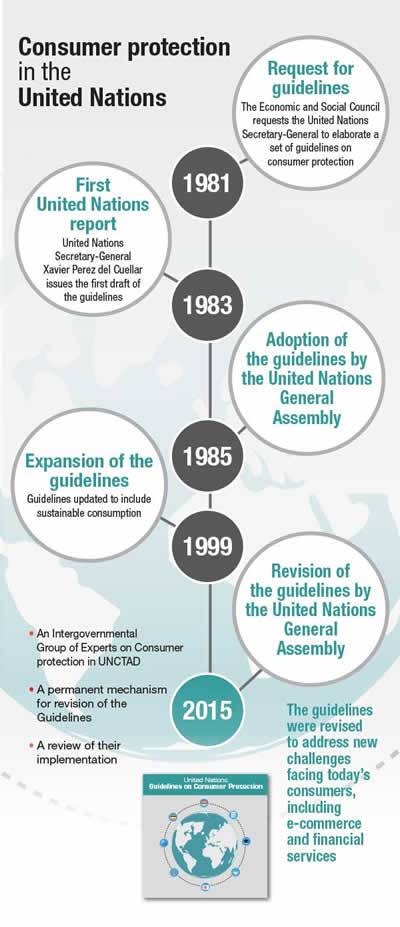With more than half the world expected to have Internet access in just three years, the rise of e-commerce poses challenges to countries where regulatory regimes do not provide robust consumer protection. World Consumer Rights Day on 15 March provides an excellent opportunity to set the agenda for consumer rights in the digital era.
On 15 March, UNCTAD joins the celebrations of World Consumer Rights Day, this year looking at the theme of "Building a digital world consumers can trust", at the G20 Consumer Summit in Berlin, Germany.
The annual celebration is an opportunity to promote the basic rights of all consumers, demanding that those rights are respected and protected, and a chance to protest against the market abuses and social injustices which undermine those rights.
World Consumer Rights Day marks the anniversary of an address by President John F Kennedy's address to the US congress on 15 March 1962, in which he formally addressed the issue of consumer rights. He was the first world leader to do so.
"As President Kennedy noted,two-thirds of all spending in the economy is by consumers," said UNCTAD Secretary-General Mukhisa Kituyi. "But they are the only important group in the economy whose views are often not heard", said John F Kennedy.
"It is our responsibility to ensure that all consumers are heard and protected, especially in the smallest developing and Least Developed Countries," Dr. Kiyuti said. "Consumer protection is not only a best economic practice but also vital for the success of the digital revolution."
Consumer protection helps all consumers by ensuring that they have the right of access to adequate information to enable them to make informed choices according to individual wishes and needs, and to effective redress.
"We must empower consumers.Dr. Kituyi said. "Consumers who know their rights and enforce them, are subject to fewer abuses which directly improves their well-being."
Today's global nterdependent markets have propelled consumers to the forefront of development policies, making them both beneficiaries and actors of change in the achievement of the Sustainable Development Goals.
Digital technology is having a dramatic impact on consumers around the world.
By 2020, 52 % of the world's population will be online - this means the number of people accessing the internet will have grown by a third in just five years. Technology has given many consumers more choice, convenience and information, but important issues remain.
A concerted effort is needed to give those not yet connected a chance to do so, at an affordable cost, while ensuring everyone's data is kept safe and secure and to help consumers know which services they can trust.
World Consumer Rights Day provides an excellent opportunity to set the agenda for a digital world that champions all that is good about Digital connectedness.
Having been mandated to serve as the focal point on consumer protection within the United Nations family by the General Assembly, UNCTAD spearheads the second session of the Intergovernmental Group of Experts (IGE) on Consumer Protection Law and Policy on 2-3 July 2017.
The IGE will be addressing the implementation of the UN Guidelines for Consumer Protection (UNGCP), the legal and institutional framework for consumer protection, the protection of vulnerable and disadvantaged consumers, the protection of consumers in e-commerce. Participants will also discuss capacity building programmes and voluntary peer reviews on consumer protection law and policy.
The UN guidelines are a valuable set of principles for setting out the main characteristics of effective consumer protection legislation, enforcement institutions and redress systems and for assisting interested member States in formulating and enforcing domestic and regional laws, rules and regulations that are suitable to their own economic and social and environmental circumstances, as well as promoting international enforcement cooperation among member States and encouraging the sharing of experiences in consumer protection.
UNCTAD continues to promote the guidelines and encourages interested member States to create awareness of the many ways in which they, business, and civil society can promote consumer protection in the provision of public and private goods and services.
UNCTAD provides technical assistance and capacity-building for consumer protection to Latin America countries, countries in the Middle East and North Africa and Asian countries.



